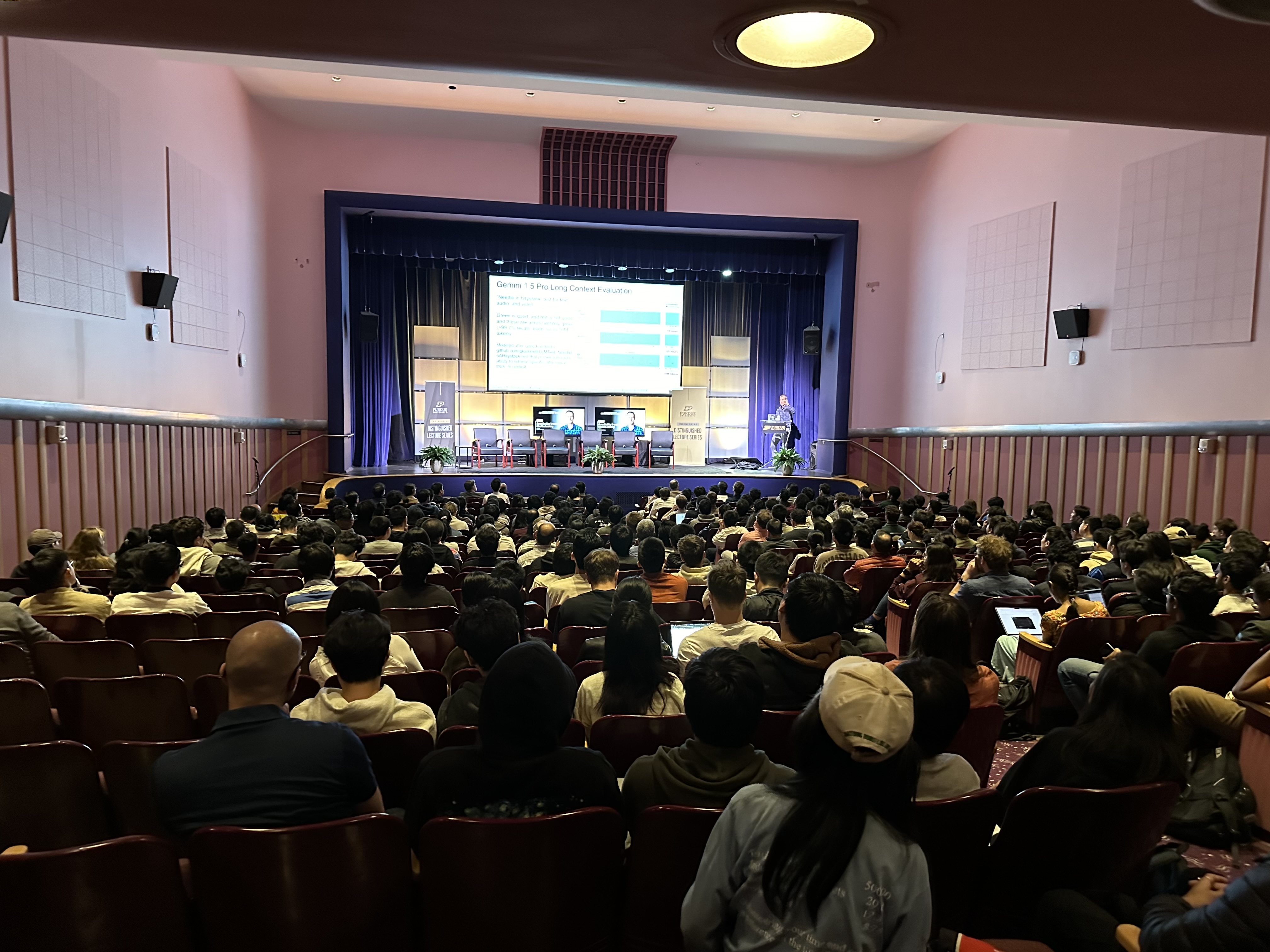Google's chief scientist visits Purdue, discusses trajectory and future promise of AI

Jeff Dean enlightened a Purdue audience at Fowler Hall about exciting new trends in machine learning (ML) and shared details of how AI is being researched and utilized at Google, where he serves as chief scientist.
Dean was on campus as part of the April 10 Purdue Engineering Distinguished Lecture Series (PEDLS). His talk was followed by a panel discussion moderated by Saurabh Bagchi, professor in the Elmore Family School of Electrical and Computer Engineering, which, along with the College of Engineering, hosted Dean’s visit. Arvind Raman, Purdue’s John A. Edwardson Dean of the College of Engineering and Robert V. Adams Professor in Mechanical Engineering, introduced Dean.
This was Dean’s first time at Purdue, and he started off by expressing his excitement at the recent strides in ML. He pointed out that the larger scale of compute, data, and model size has contributed to the enormous success of AI. In parallel, the kinds of computations that Google runs and the hardware on which to run them have changed dramatically. This progress has been well illustrated by the ability of AI models to create outputs from input data, e.g., being fed an image it can identify, such as a cheetah lying on top of a car. Recent advancements in generative models are reversing the direction of the arrow; given the text, it can generate a video corresponding to it.
Dean discussed significant progress in AI accelerators exemplified by Google’s Tensor Processing Unit (TPU), whose fifth generation was released in 2023. Next, he discussed 15 years of language model advances, starting with large-scale N-gram models in 2017 and the latest major advancement — Google’s Gemini released in December 2023.
Gemini’s goal is to train the world’s best multimodal models and use them all across Google. It comes in three model size classes, from Ultra (the largest and most capable model for highly complex tasks) through Pro (best model for scaling across a range of tasks) to Nano (efficient model for on-device tasks). He explained how each technique allows Gemini to train efficiently and reliably on a large scale.
Dean showed two examples of Gemini’s multimodal capability. The first involved solving an arithmetic or physics problem while displaying the intermediate steps and even correcting a student’s mistake in handwritten text.
The second example outlined Gemini’s ability to ingest context in an input from a much larger window to answer a query. The window can range from a block of text to a full-length video. Gemini version 1.5, released in February 2024, can ingest 10M tokens of text or video. Dean demonstrated its capability through a 44-minute Buster Keaton film, which Gemini took as input. It could then answer specific and multimodal questions, like when an event corresponding to a hand-drawn figure occurred in the film.
Dean highlighted Gemini’s ability to understand entire codebases, identify urgent bugs or vulnerabilities and implement a fix. In February 2024, Google also released Gemma, the open source version of Gemini.
He called attention to a broad trend in which ML is being used in more personal contexts, like in computational photography, which is used to customize photos taken by consumers’ personal devices. Such technology can allow other modes of interaction such as live captioning, translating or reading aloud. He made the observation that when a general-purpose ML model is customized for specific usage scenarios, such specific models go on to perform well in the specific domains, like screening for diabetic retinopathy.
Dean concluded by sketching out the AI principles that Google laid out in June 2018. Many of the areas covered by these principles are not solved problems. Rather, they are vibrant areas of research where Google has been publishing at a rapid rate, with about 200 Google research papers since 2018 on topics such as ML fairness, bias, privacy and safety.
Dean’s takeaways are that AI has made major progress in computers’ abilities to understand, perceive, and reason about the world around them. The need to continue to make progress creates tremendous opportunities for the technical community, but also tremendous responsibilities.
Beginning in 2018, the Purdue Engineering Distinguished Lecture Series has been inviting world-renowned faculty and professionals to Purdue Engineering to encourage thought-provoking conversations and ideas with faculty and students regarding the grand challenges and opportunities in their fields. Besides presenting a lecture to a broad audience of faculty, graduate and undergraduate students, they engage in an interactive panel with Purdue faculty and students.

